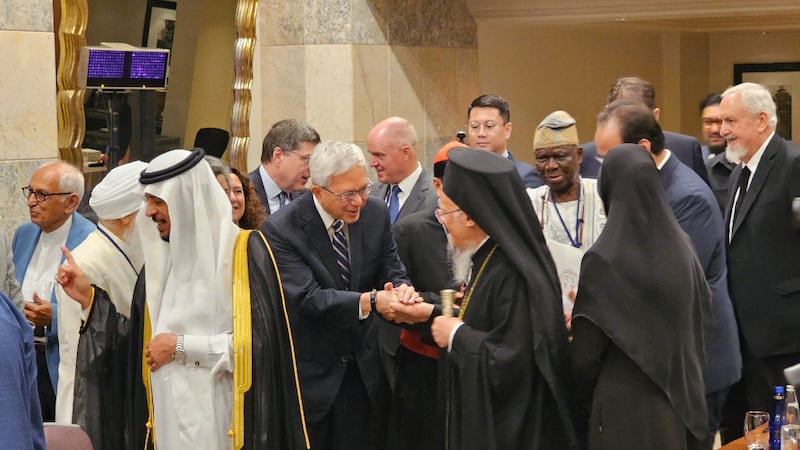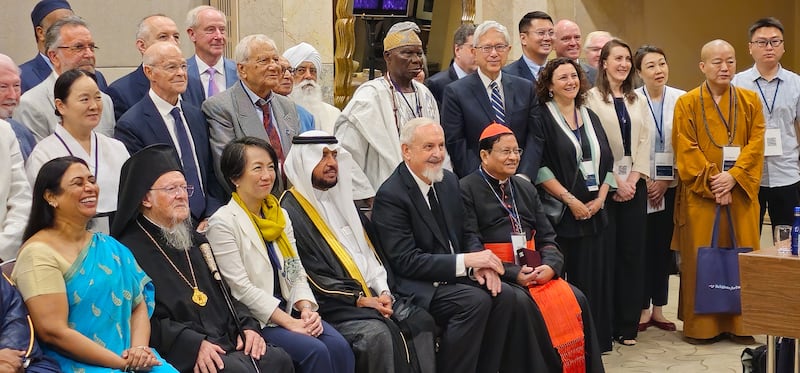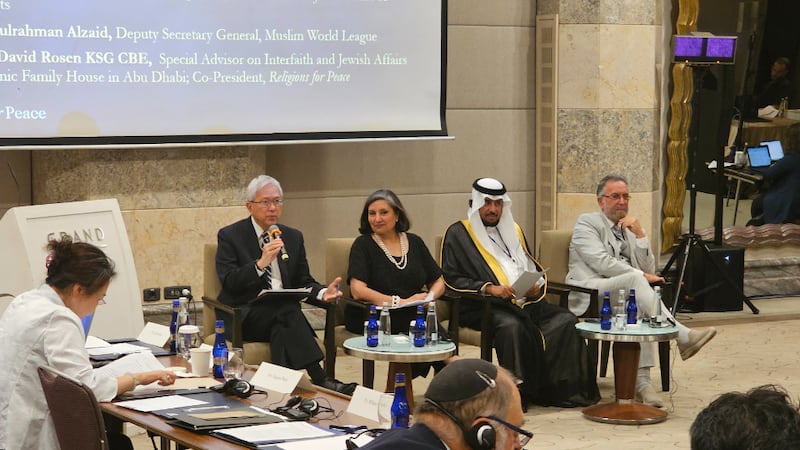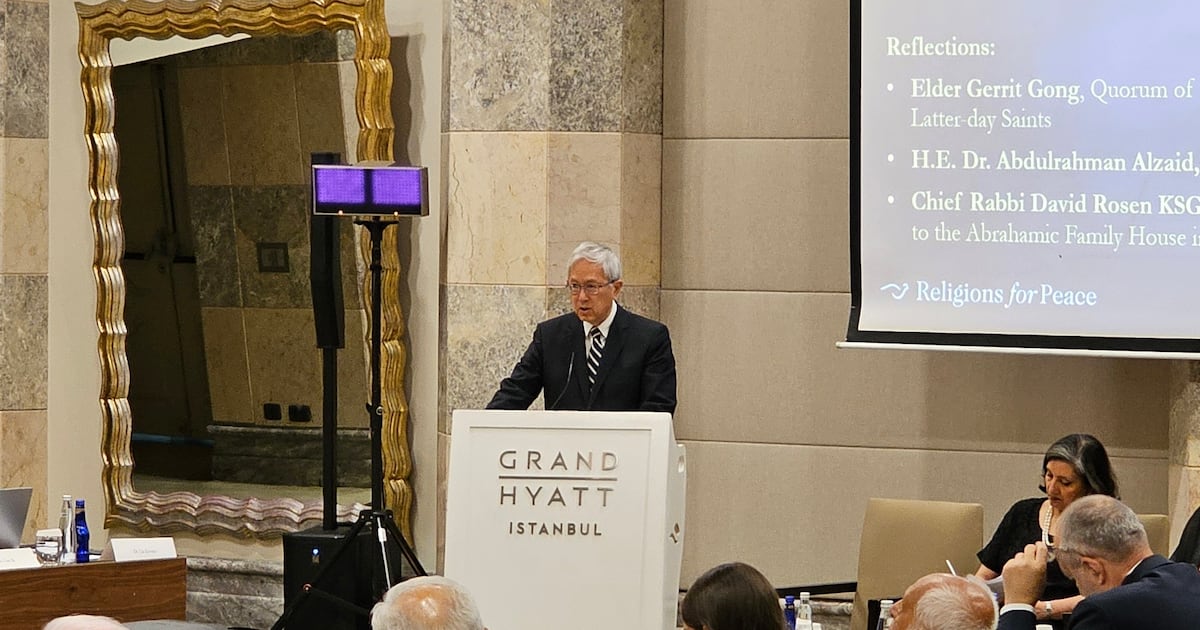31 July 2025, 10:20 a.m. MDT
While in Istanbul, Republic of Türkiye, Elder Gerrit W. Gong of the Quorum of the Twelve Apostles called for faith communities to help safe, ethical and trustworthy artificial intelligence.
His address at the Religions for Peace World Council on July 29 was titled “Faith, Ethics, and Human Dignity in an Age of Artificial Intelligence (AI).”
“As we enter uncharted technological and ethical territory, we need especially now to align AI’s pervasive exponential reach with enduring faith-based ethical principles and moral values,” he said.
His remarks were reported in a news release from the Europe Newsroom of The Church of Jesus Christ of Latter-day Saints, with text of the full address posted on ChurchofJesusChrist.org.
Elder Gong said AI is constantly being reshaped, and benchmarks are not fully established.
“We confront profound questions: what it means to be human; who and what will define perceptual ‘truth’; emotional relationships between humans and AI (including AI companions); business models; how we understand divine principles of work, faith and reasoning, even relationship with the Divine.”
 Elder Gerrit W. Gong of the Quorum of the Twelve Apostles shakes hands with H.A.H. Bartholomew I of Constantinople, Ecumenical Patriarch of Constantinople, after a session of the World Council of Religions for Peace in Istanbul, Republic of Türkiye, Tuesday, July 29, 2025. | The Church of Jesus Christ of Latter-day Saints
Elder Gerrit W. Gong of the Quorum of the Twelve Apostles shakes hands with H.A.H. Bartholomew I of Constantinople, Ecumenical Patriarch of Constantinople, after a session of the World Council of Religions for Peace in Istanbul, Republic of Türkiye, Tuesday, July 29, 2025. | The Church of Jesus Christ of Latter-day Saints
Elder Gong said as this world enters such unchartered territory, now is the time to align AI’s reach with enduring faith-based ethical principles and moral values. He called for global faith leaders to act in three AI-centered areas which affect faith, ethics, and human dignity.
1. Help society understand AI is not and cannot be God
“No set of utilitarian AI algorithms should determine or speak for our most treasured human values and spiritual experiences. AI cannot provide inspired divine truth or independent moral guidance,” he said.
Those who try to make AI into a deity may find themselves in a modern Tower of Babel situation, where their manmade efforts cannot reach heaven.
The most precious truth, comfort, revelation and guidance come when people personally commune with God, Elder Gong said.
2. Consciously choose and intentionally use AI as a tool for good
The world will need the best that its religious and moral heritages can offer, Elder Gong said.
“As religious leaders, we can intentionally articulate and foster a vision for the world that counterbalances AI which drives algorithmic efficiencies and AI which protects and promotes human flourishing and common prosperity.”
 Elder Gerrit W. Gong of the Quorum of the Twelve Apostles, center right, joins fellow participants of the World Council of Religions for Peace for a group photo in Istanbul, Republic of Türkiye, Tuesday, July 29, 2025. | The Church of Jesus Christ of Latter-day Saints 3. Champion safe, ethical, and trusted AI
Elder Gerrit W. Gong of the Quorum of the Twelve Apostles, center right, joins fellow participants of the World Council of Religions for Peace for a group photo in Istanbul, Republic of Türkiye, Tuesday, July 29, 2025. | The Church of Jesus Christ of Latter-day Saints 3. Champion safe, ethical, and trusted AI
Elder Gong said the moral compass should not be dedicated only by technology or the small group developing AI. Instead, a united effort is needed encompassing faith-based, civic and technology leaders to champion safe and responsible, human-centric AI.
Faith must be involved because religious believers contribute in significant ways to human flourishing and common prosperity, Elder Gong explained. He cited Pew Research Center statistics showing that 76 percent of the world’s people identify with a religion. And he pointed out that many people are deeply concerned for the future of AI and skeptical of corporations, countries and governments.
“Even in a world influenced by secular thought, not only religious believers but citizens everywhere want religious and moral leaders to help ensure AI is safe and can be trusted,” said Elder Gong.
A faith community AI evaluation
In March 2024, Elder Gong introduced guiding principles for using AI to employees of The Church of Jesus Christ of Latter-day Saints worldwide.
These principles include spiritual connection, transparency, privacy and security, and accountability. Elder Gong invited Church employees to consider the appropriate use of AI prayerfully and with the guidance of the Holy Ghost.
In his address in the Republic of Türkiye, Elder Gong called for mutually respectful and practical dialogue among religious leaders as they work together on these issues.
 Elder Gerrit W. Gong of the Quorum of the Twelve Apostles participates in a panel at the Religions for Peace meeting of the World Council in Istanbul, Republic of Türkiye, Tuesday, July 29, 2025. | The Church of Jesus Christ of Latter-day Saints
Elder Gerrit W. Gong of the Quorum of the Twelve Apostles participates in a panel at the Religions for Peace meeting of the World Council in Istanbul, Republic of Türkiye, Tuesday, July 29, 2025. | The Church of Jesus Christ of Latter-day Saints
What he called a “Faith Community AI Evaluation” can help, he said. This evaluation can help ensure AI systems portray persons of faith and religious beliefs in a respectful and accurate manner.
A Faith Community AI Evaluation can also offer training and use cases “so AI models include faith-based moral and ethical purposes, principles, and training reflective of our best pluralistic, societal values,” Elder Gong said. Such an evaluation can also provide a valuable additional AI check-and-balance, he said.
Elder Gong concluded, “In the Christian tradition, Jesus Christ declares, ‘I am the way, the truth, and the life’ (John 14:6). In coming days, let us unite our best efforts to identify ways and truths that help us live our best lives with faith, ethics, and human dignity in an age of artificial intelligence.”
With exponentially compounding AI technologies promising new ideas and new possibilities in coming years, we confront profound questions:
• What it means to be human?
• Who and what will define perceptual “truth”?
• Emotional relationships between humans and AI (including AI… pic.twitter.com/EukgDM9tCA
— Gerrit W. Gong (@GerritWGong) July 29, 2025

